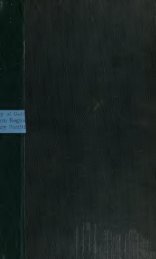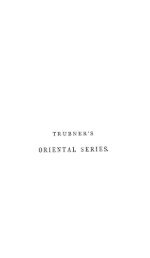Untitled
Untitled
Untitled
Create successful ePaper yourself
Turn your PDF publications into a flip-book with our unique Google optimized e-Paper software.
EARLY STRUGGLES OF M,u'izzi (<br />
> 4$<br />
Mahmud, who, seeing 1/im thus magnificently equipped, legarded<br />
him with the same regard, and his afifai/s reached such a pitch<br />
of' prosperity that twenty servants girt with silver girdles rode<br />
behind him. ,<br />
, ANECDOTE XW.<br />
In the year A.M. 519 (A-.D. 1116-11*7) the King of Islam,<br />
Sanjar the son of Malikshah the Saljuq (may God prolong his<br />
existence and continue his exaltation to the heights !), chanced<br />
to be encamped at the spring season within the marches of Tus,<br />
in the plain of Turuq 1 where he , remained for two months. There<br />
I, in hojpes of obtaining some favour, joined his Court from Herat,<br />
having then, in the" nothing way of equipment (**) or provision.<br />
I composed a qasida and we/it to Mu'izzi the Poet-laureate, to<br />
seek an opening through him. Having looked at my poem, he<br />
tested me in several ways, and I satisfied his expeptations. He<br />
then behaved in the most generous manner* and deemed it his<br />
duty to act in the way befitting so great a man.<br />
One day I expressed in his presence a hope that fortune<br />
would be more favourable to me, and complained of my luck.<br />
He encouraged me, saying, " Thou hast laboured hard to acquire<br />
this science, and hast fully mastered it : surely this will have its<br />
effect. My own case was precisely similar and ; good poetry has<br />
never yet been wasted. Thou hast a goodly share in this art:<br />
thy verse is even and melodious, and is still improving. Wait<br />
and see the advantages which thou wilt reap from this science.<br />
For though Fortune should at first be grudging, matters will<br />
eventually turn out as thou wishest.<br />
" My father Burhanf, the Poet-laureate (may God be merciful to<br />
him !) passed away from this transitory to that eternal world jn the<br />
town of Qazwin in the early part of the reign of Malikshah, en-<br />
trusting me to the King in this verse, since then become famous 2 :<br />
*<br />
" J amfitting^ but I leave a son behind me,<br />
And csmmend him to my God and to my King."<br />
1 This is place not mentioned in the geographies, but the Editor (p. \1A of the<br />
notes) believt5 it to be identical with the niydern Turuq, a large village distant two<br />
parasangs from Mashhad on the road to Tihran.<br />
2 This verse, to which aje added several others, is commonly ascribed to the<br />
Nizamu'1-Mulk, e.g. by Dawlatshah (p. o^ of my edition). Apart from the improbabilfty<br />
that one who lay dying of a mortal wound would be in the mood to<br />
c6mpose "verses, we learn from this anecdote that the Nizamu'1-Mulk "had no opinion<br />
of poets because he had no skill in their art." The verse which gives his age as 94 at<br />
the time of his death, when he was in reality some fifteen or twenty years younger<br />
(borrv4o8/ 1 01 7 'assassinated 485/1092), is alone enough to discredit the legend, while<br />
the authority of the Chahdr Maqdla, of which the author derived his information<br />
directly'from Mu^izzi, the son of Burhani, is far superior to any other source of the<br />
story* Compare my Lit. Hist, of Persia, vol. ii, pp. 188-193, and the Persian notes,<br />
pp. i1\ \1V








![La religione di Zarathustra nella storia religiosa dell' Iran [microform]..](https://img.yumpu.com/15970820/1/151x260/la-religione-di-zarathustra-nella-storia-religiosa-dell-iran-microform.jpg?quality=85)


